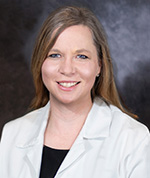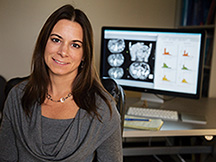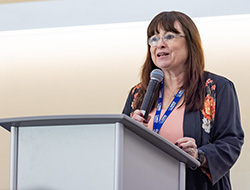School of Medicine Office of Research Newsletter
Volume 2.2 - January 2023

Message from the Associate Dean of Research Data and Innovation
 Happy New Year to all of you!
Happy New Year to all of you!
Each new year is filled with a sense of excitement about the possibilities that lay ahead and 2023 is poised to be a great year for the School of Medicine.
We just celebrated our incredible accomplishment of record extramural research funding and are well positioned to continue the trend into the new year. Construction and occupancy planning for Aggie Square is also well underway. Aggie Square will give us the ability to bring together the community, industry partners and our faculty to collaborate on transformational health solutions. We are also watching with great enthusiasm as construction of the California Tower is now underway.
In each of these areas, innovation will play an important role in our School of Medicine strategic roadmap. I am delighted to serve as the inaugural Associate Dean of Data Science and Innovation for the School of Medicine. The development of this new position is a reflection of our commitment to growing and developing our academic footprint in the rapidly expanding arenas that encompass digital health, data science, and informatics.
Innovation is at the heart of UC Davis Health and the School of Medicine. I am glad to be partnering with many groups across both the health campus and UC Davis to expand our abilities to support School of Medicine faculty in their academic endeavors in the data science and related fields. One of these pivot projects for us has been the multiyear implementation of an enterprise-wide Clinical Trials Management System (CTMS) which is well underway. I have had the privilege for the last several years of leading the talented team assembled across the school and information technology that have worked tirelessly to make this reality. Despite the many pandemic challenges that we faced in the research domain, we have successfully created 600 clinical trial protocols with the new system and are actively enrolling patients into these protocols.
With every new change there are certainly growing pains, but the new system has great potential to make our work more efficient, timely, and consistent across our departments. We are eagerly looking forward to later in 2023 when we will have our next two large scale deployments of the CTMS which will include the Cancer Center. Platforms like the CTMS are just one of the many tools the school has partnered with the IT Data Center of Excellence to bring to our faculty. A few other examples of the many recent advancements include a Part 11 compliant DocuSign Electronic Signature for Research, transition to UC Profiles for faculty profiles, and the acquisition of the geocoding data for all UC Davis electronic medical records. Having the right tools for our research community in the data science space is a necessity and this is just one of the many areas that we will evaluate over the next year. As I embark on this new role, I look forward to spending time meeting with many of you as we evaluate, build, and grow our expertise in data science.
Rachael Callcut, M.D., M.S.P.H., F.A.C.S.
Associate Dean for Data Science and Innovation
Vice Chair, Clinical Science Department of Surgery
UC Davis School of Medicine
UC Davis Health Patient Address Geocoding and ADI/HPI Health Indexes Available
This past year, the UC Davis Data Center of Excellence (DCOE) acquired data from Esri geocoding solution, Street Map, to assign geolocation reference points for all patients in the UC Davis electronic medical record (EMR). Every patient’s current address that is stored within the EMR Clarity and Caboodle databases has been updated with Census Tract and Census Block Group map boundaries for the Map Visualization, and with new filters for a patient’s census tract, census block group, and Area Deprivation Index (ADI) and Healthy Places Index (HPI) scores. These ADI/HPI scores were additionally validated as part of the DCOE’s development effort this year. The Esri geocoding solution, along with pre-processing algorithms, allows UC Davis Health to geocode approximately 93% of patient addresses with high-quality addressable strings. The process is automated using Python to reduce the processing and staff support time. Researchers interested in utilizing ADI/HPI geocoded patient information can access through Epic SlicerDicer filter criteria.
Additional information regarding the geocoding services can be found here (VPN required):
Recognition
 A national research team led by Diana Miglioretti secured a $15 million Program Project grant renewal to develop equitable strategies for risk-based breast cancer screening and surveillance. The grant renewal allows for the incorporation of artificial intelligence algorithms into risk prediction models to identify individuals who are at high risk of advanced cancer despite regular screening or at risk of second cancer missed by annual mammography. The team will also evaluate whether five commercially available artificial intelligence algorithms can improve the accuracy of mammography interpretation. Miglioretti is dean’s professor and division chief of biostatistics at the UC Davis Department of Public Health Sciences and a researcher at UC Davis Comprehensive Cancer Center. She is the Biostatistics Shared Resource Core Director and Population Sciences and Health Disparities Program Co-Leader.
A national research team led by Diana Miglioretti secured a $15 million Program Project grant renewal to develop equitable strategies for risk-based breast cancer screening and surveillance. The grant renewal allows for the incorporation of artificial intelligence algorithms into risk prediction models to identify individuals who are at high risk of advanced cancer despite regular screening or at risk of second cancer missed by annual mammography. The team will also evaluate whether five commercially available artificial intelligence algorithms can improve the accuracy of mammography interpretation. Miglioretti is dean’s professor and division chief of biostatistics at the UC Davis Department of Public Health Sciences and a researcher at UC Davis Comprehensive Cancer Center. She is the Biostatistics Shared Resource Core Director and Population Sciences and Health Disparities Program Co-Leader.
Five School of Medicine Researchers among ‘1,000 Best Female Scientists in the World’

Five UC Davis Health faculty members have been recognized among the top female scientists around the globe according to Research.com’s 2022 ranking of the Top 1000 Female Scientists in the World. The list, compiled by the online research portal for scientists, was created to help provide more opportunities, visibility and equal chances for women in science. The recognized faculty members work in a variety of scientific fields. Four of the five are faculty members at the UC Davis MIND Institute. The ranked School of Medicine scientists are Jacqueline N. Crawley, Randi Jenssen Hagerman, Sally J. Rogers, Irva Hertz-Piciotto and Nancy E. Lane.
Impactful Publications
Our faculty publish their findings in "high-impact journals" - those considered to be highly influential in their fields. A journal's impact factor is a measure of the frequency with which an average article in a journal has been cited in a particular year. The impact factor of a journal is an index number calculated by Clarivate and frequently used as a proxy for the importance of the journal in its field.
Miguel Martín-Aragón Baudel is first author of “Spatiotemporal Control of Vascular CaV1.2 by α1C S1928 Phosphorylation,” published in the November 8 edition of Circulation Research. Baudel is a post-doc researcher in the lab of Manuel Navedo (corresponding author), professor in the Department of Pharmacology. Additional UC Davis co-authors of this study are post-docs Victor Flores-Tamez, Junyoung Hong, Raghavender R. Gopireddy, Kwon Nuk Mimi Kan, associate professional researcher Pauline Maillard, student Abby Burns, distinguished professor and chair of pharmacology Donald M. Bers, pharmacology professor Johannes W. Hell and pharmacology assistant professor Madeline Nieves-Cintron. This paper reports that CAV1.2 activity is controlled through phosphorylation (addition of a phosphoryl group to a molecule), with implications for the development of therapeutics to correct CAV1.2 and arterial function during diabetic hyperglycemia.
George Thompson is lead author of study published by a team of international researchers and trial investigators, “Rezafungin versus caspofungin for treatment of candidaemia and invasive candidiasis (ReSTORE): A multicentre, double-blind, double-dummy, randomised phase 3 trial,” which appeared in the November 25 edition of The Lancet. Thompson is a professor with a joint appointment in the Departments of Internal Medicine and Medical Microbiology and Immunology. The study looks at a next-generation drug, rezafungin, in the treatment of candidaemia and invasive candidiasis and for the prevention of invasive fungal disease caused by Candida, Aspergillus, and Pneumocystis spp after blood and marrow transplantation.
Professor and chair of pediatrics, Satyanarayana Lakshminrusimha is co-author of a study published in the December edition of the American Journal of Respiratory and Critical Care Medicine. “Maldevelopment of the Immature Pulmonary Vasculature and Prolonged Patency of the Ductus Arteriosus – Association or Cause?” examines the importance of enhanced surveillance for pulmonary arterial hypertension in high-risk preterm infants with prolonged experience with a patent ductus arteriosus (PDA). PDA occurs when the normal opening between the two major blood vessels leading from the heart that is seen in the fetus persists after birth.
Get to Know School of Medicine Office of Research
 The School of Medicine Office of Research Grants Facilitation Unit (GFU) provides high-quality support to UC Davis School of Medicine investigators in developing, writing/editing, and finalizing grant proposals to fund their research programs. Can you guess what is essential for research but can be a daunting task for most investigators? If you guessed “grant writing,” you’re correct! Grant writing can be intimidating and overwhelming, even for well-established investigators. The Grants Facilitation Unit is here to help School of Medicine investigators with their grant writing challenges! The GFU offers high-quality support to meet the needs of investigators, including providing one-on-one consultations, organizing strategic initiatives, critically reviewing proposals, offering educational classes and seminars, and connecting researchers across disciplines.
The School of Medicine Office of Research Grants Facilitation Unit (GFU) provides high-quality support to UC Davis School of Medicine investigators in developing, writing/editing, and finalizing grant proposals to fund their research programs. Can you guess what is essential for research but can be a daunting task for most investigators? If you guessed “grant writing,” you’re correct! Grant writing can be intimidating and overwhelming, even for well-established investigators. The Grants Facilitation Unit is here to help School of Medicine investigators with their grant writing challenges! The GFU offers high-quality support to meet the needs of investigators, including providing one-on-one consultations, organizing strategic initiatives, critically reviewing proposals, offering educational classes and seminars, and connecting researchers across disciplines.
Many successful research leaders started their careers with a K-award. Career development awards (K01, K08, K23, K99/R00, etc.) are a category of grants from the National Institutes of Health (NIH) that, for the most part, provide early career researchers with protected time, tailored training, and mentorship to augment their skills, which will allow the investigator to be excellently positioned to launch their independent research careers.
The GFU identified a need for a grant writing program focused on early-career investigators and postdocs at UC Davis School of Medicine aiming to submit career development awards. In 2022, the GFU designed and developed a new grant writing training program, KOHORT, to support School of Medicine-associated investigators in creating and submitting a career development award to the NIH.
Based on past research from the NIH-funded National Research Mentoring Network, KOHORT is a 5-month program that will be led by GFU’s highly experienced team. Erica Chédin, Ph.D., has been a coach multiple times for the National Research Mentoring Network (NRMN). Hardeep Obhi, Ph.D., specializes in guiding early career investigators and has experience developing and leading grant writing workshops. Jeffrey Engler, Ph.D., is co-I for the NRMN grant writing coaching research study at the University of Utah and has been a grant writing coach in several NIH-funded grant writing coaching programs.
KOHORT will utilize a model that includes bi-weekly peer group feedback on draft grant materials, research development support by local mentors, and a team of trained grant writing instructors. Upon completion of KOHORT, participants will be well positioned to submit a career development award. The first KOHORT recruits will start in spring 2023.
KOHORT Applications Open Now
The application process will be open from January 4 – February 15, 2023; participants will be notified of their acceptance by March 15, 2023, and the program will run from April 20 – September 20, 2023.
Contact Erica Chédin, Ph.D., at emchedin@ucdavis.edu with questions.
School of Medicine Office of Research Grants Facilitation Unit Team
Erica Chédin, Ph.D.
Director
emchedin@ucdavis.edu
Hardeep Obhi, Ph.D.
Early Stage Investigators and Career Development
Research Development Specialist
hkobhi@ucdavis.edu
Jeffrey Engler, Ph.D.
Research Development Specialist
jaengler@ucdavis.edu
Heather Hughes, Ph.D.
Research Development Specialist
hkahughes@ucdavis.edu
Feature: Cervical Cancer Awareness Month

A preventable disease
The Centers for Disease Control and Prevention reports that 9 out of 10 cervical cancers are caused by human papillomavirus (HPV) infection, making it among the most preventable of cancers. Yet, despite the availability of an HPV vaccine, about 13,000 new cases of cervical cancer are diagnosed each year in the United States and about 4,000 women die of this cancer. Hispanic women have the highest rates of developing cervical cancer, and Black women have the highest rates of dying from it.
Preventing cervical cancer through education and vaccine awareness is a large part of the work of the California HPV Vaccination Roundtable’s Engaging Health Systems and Providers Workgroup, co-chaired by Julie Dang. Dang is an assistant adjunct professor in the Department of Public Health Sciences and executive director of the UC Davis Comprehensive Cancer Center’s Office of Community Outreach and Engagement. The workgroup launched “The HPV Vaccination Learning Collaborative” to raise awareness among health care professionals about the importance of increasing HPV vaccination rates in California.
Dang has launched and participated in research on this issue. Along with Moon Chen, internal medicine professor in residence and nationally renowned expert in cancer health disparities, and Northern Valley Indian Health in Willows, she conducted a study in rural Glenn County focused on evidence-based methods of increasing vaccination rates among rural teenagers, for whom vaccination rates lag compared to their urban peers. This study was published in the June 2022 issue of Journal of Rural Health. Dang, Chen and the UC Davis Comprehensive Cancer Center are also co-writers of Harvard Law Center’s 2022 HPV Vaccine Policy Landscape, a toolkit to help communities understand their options for increasing HPV vaccination rates.
They are also involved in a project focused on mitigating Asian American cancer health disparities through a collaboration with a local federally qualified health center lookalike. This project provides training to medical assistants on culturally appropriate strategies to engage and educate their Asian American patients on cancer screenings including screening for cervical cancer.
New treatments
Rebecca Brooks, associate professor of gynecologic oncology in the Obstetrics and Gynecology Department, recently guested on the Cancer Center’s podcast, Beat Cancer, to talk about how research in her field has changed the game in diagnosis and treatment in her own specialty of reproductive cancer. Cancers of the reproductive system include cervical, endometrial and ovarian cancers. “Because early detection of these cancers can be difficult, research is looking at identifying biomarkers to help in earlier detection,” she told podcast co-hosts Stephanie Winn and Chris Joyce. Brooks’ population-based research has used data to identify disease behavior and also the barriers to care. “We are looking at how we can make sure to accurately identify people at risk and get them treatment where they are.”
Clinical trials are a promising area of treatment and discovery, she adds. “We have a number of clinical trials open at UC Davis. The field has expanded impressively over the last few years. Newer medical therapies developed through clinical trials include medications that serve as alternatives to surgical treatments. They work through the DNA repair pathways and are even more effective in patients who have genetic mutations – these have changed the prognoses for some of these patients. We also have a whole class of targeted agents – drugs that block cancer cells from developing new blood vessels.” Brooks and her colleague in the department, assistant clinical professor Hui Chen, are currently working on several studies that focus on cancer-blocking therapies focused on tumors associated with specific genes, and on studies combining medications with radiation treatments. Chen is PI on a cervical cancer-specific study, a Phase 3 trial of pembrolizumab (Keytruda) to evaluate its use along with chemoradiotherapy in participants with locally advanced cervical cancer.
UC Davis Comprehensive Cancer Center
UC Davis Comprehensive Cancer Center is the only National Cancer Institute-designated center serving the Central Valley and inland Northern California, a region of more than 6 million people. Its specialists provide compassionate, comprehensive care for more than 100,000 adults and children every year and access to more than 200 active clinical trials at any given time. Its innovative research program engages more than 240 scientists at UC Davis who work collaboratively to advance discovery of new tools to diagnose and treat cancer. Patients have access to leading-edge care, including immunotherapy and other targeted treatments. Its Office of Community Outreach and Engagement addresses disparities in cancer outcomes across diverse populations, and the Cancer Center provides comprehensive education and workforce development programs for the next generation of clinicians and scientists. For more information, visit https://health.ucdavis.edu/cancer/.
WeCare
Researchers at Drexel University and University of California, Davis are seeking family caregivers of people living with dementia for a nationwide study. The WeCareAdvisor is a tool to help family caregivers manage dementia-related behaviors. By walking caregivers through a step-by-step approach to understand why behaviors may be occurring, the WeCareAdvisor provides tailored strategies to help manage them. Eligible caregivers are 21 or older; the primary caregiver of a person with dementia; currently managing dementia-related behaviors; have an internet-capable device; and live in the United States. For more information, email WeCare@drexel.edu, call 267-359-1111, or visit http://wecareadvisorstudy.com.
Review: Research Celebration
 The School of Medicine Office of Research hosted the first School of Medicine Research Celebration since 2019, on November 18, 2022. The participants heard from UC Davis Leadership, including School of Medicine Vice Dean for Research, Kim E. Barrett (pictured), who welcomed the crowd and the presenters. A capacity crowd got to hear UC Davis Vice Chancellor for Research, Prasant Mohapatra remark on the exceptional year of research milestones enjoyed by the UC Davis School of Medicine. School of Medicine Office of Research leadership – Associate Deans Ted Wun and Angela Haczku and Assistant Dean Anuurad Erdembileg - socialized with the crowd. Refreshments and a raffle topped off the event.
The School of Medicine Office of Research hosted the first School of Medicine Research Celebration since 2019, on November 18, 2022. The participants heard from UC Davis Leadership, including School of Medicine Vice Dean for Research, Kim E. Barrett (pictured), who welcomed the crowd and the presenters. A capacity crowd got to hear UC Davis Vice Chancellor for Research, Prasant Mohapatra remark on the exceptional year of research milestones enjoyed by the UC Davis School of Medicine. School of Medicine Office of Research leadership – Associate Deans Ted Wun and Angela Haczku and Assistant Dean Anuurad Erdembileg - socialized with the crowd. Refreshments and a raffle topped off the event.
